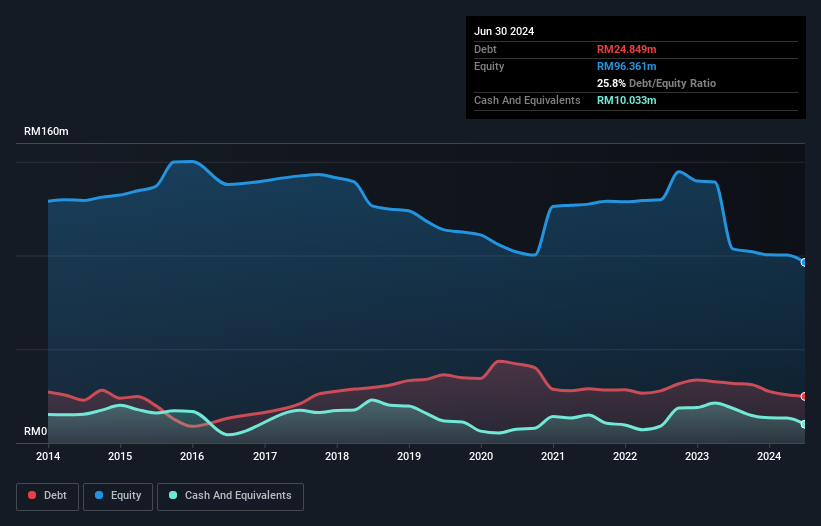The external fund manager backed by Berkshire Hathaway's Charlie Munger, Li Lu, makes no bones about it when he says 'The biggest investment risk is not the volatility of prices, but whether you will suffer a permanent loss of capital.' So it seems the smart money knows that debt - which is usually involved in bankruptcies - is a very important factor, when you assess how risky a company is. We note that Rex Industry Berhad (KLSE:REX) does have debt on its balance sheet. But the real question is whether this debt is making the company risky.
Why Does Debt Bring Risk?
Debt is a tool to help businesses grow, but if a business is incapable of paying off its lenders, then it exists at their mercy. Part and parcel of capitalism is the process of 'creative destruction' where failed businesses are mercilessly liquidated by their bankers. However, a more frequent (but still costly) occurrence is where a company must issue shares at bargain-basement prices, permanently diluting shareholders, just to shore up its balance sheet. Of course, debt can be an important tool in businesses, particularly capital heavy businesses. The first step when considering a company's debt levels is to consider its cash and debt together.
See our latest analysis for Rex Industry Berhad
How Much Debt Does Rex Industry Berhad Carry?
As you can see below, Rex Industry Berhad had RM24.8m of debt at June 2024, down from RM31.8m a year prior. However, it does have RM10.0m in cash offsetting this, leading to net debt of about RM14.8m.

How Healthy Is Rex Industry Berhad's Balance Sheet?
According to the last reported balance sheet, Rex Industry Berhad had liabilities of RM51.4m due within 12 months, and liabilities of RM8.08m due beyond 12 months. On the other hand, it had cash of RM10.0m and RM23.7m worth of receivables due within a year. So it has liabilities totalling RM25.7m more than its cash and near-term receivables, combined.
While this might seem like a lot, it is not so bad since Rex Industry Berhad has a market capitalization of RM55.9m, and so it could probably strengthen its balance sheet by raising capital if it needed to. But we definitely want to keep our eyes open to indications that its debt is bringing too much risk. The balance sheet is clearly the area to focus on when you are analysing debt. But you can't view debt in total isolation; since Rex Industry Berhad will need earnings to service that debt. So when considering debt, it's definitely worth looking at the earnings trend. Click here for an interactive snapshot.
Over 12 months, Rex Industry Berhad made a loss at the EBIT level, and saw its revenue drop to RM131m, which is a fall of 20%. That's not what we would hope to see.
Caveat Emptor
Not only did Rex Industry Berhad's revenue slip over the last twelve months, but it also produced negative earnings before interest and tax (EBIT). To be specific the EBIT loss came in at RM3.5m. When we look at that and recall the liabilities on its balance sheet, relative to cash, it seems unwise to us for the company to have any debt. Quite frankly we think the balance sheet is far from match-fit, although it could be improved with time. However, it doesn't help that it burned through RM1.8m of cash over the last year. So to be blunt we think it is risky. There's no doubt that we learn most about debt from the balance sheet. But ultimately, every company can contain risks that exist outside of the balance sheet. To that end, you should learn about the 3 warning signs we've spotted with Rex Industry Berhad (including 2 which make us uncomfortable) .
When all is said and done, sometimes its easier to focus on companies that don't even need debt. Readers can access a list of growth stocks with zero net debt 100% free, right now.
New: AI Stock Screener & Alerts
Our new AI Stock Screener scans the market every day to uncover opportunities.
• Dividend Powerhouses (3%+ Yield)
• Undervalued Small Caps with Insider Buying
• High growth Tech and AI Companies
Or build your own from over 50 metrics.
Have feedback on this article? Concerned about the content? Get in touch with us directly. Alternatively, email editorial-team (at) simplywallst.com.
This article by Simply Wall St is general in nature. We provide commentary based on historical data and analyst forecasts only using an unbiased methodology and our articles are not intended to be financial advice. It does not constitute a recommendation to buy or sell any stock, and does not take account of your objectives, or your financial situation. We aim to bring you long-term focused analysis driven by fundamental data. Note that our analysis may not factor in the latest price-sensitive company announcements or qualitative material. Simply Wall St has no position in any stocks mentioned.
About KLSE:REX
Rex Industry Berhad
An investment holding company, engages in the manufacture, distribution, trading, and export of halal canned food, frozen food, beverage, chocolate malt and premix products, and coconut milk.
Excellent balance sheet with low risk.
Market Insights
Community Narratives



